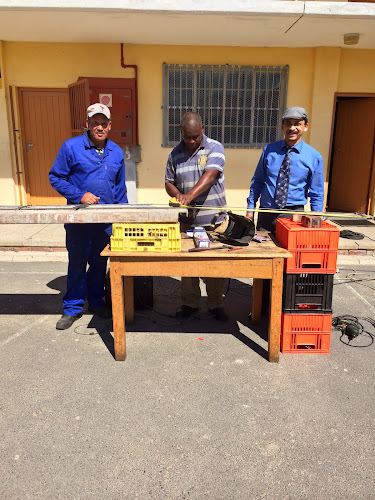Classroom libraries and other school business at Harmony Primary School
 |
| Ernst Esau (far right) standing with the welder and the school caretaker |
I visited Harmony Primary School today at the request of the principal, Ernst Esau. We had spoken on the telephone earlier and our conversation centred on Ernst's frustrations with their "plankie" school building and the high maintenance bill the school had to foot. Ernst has also been watching the renovations at other schools and our apparent disregard for their plight dominated our discussion. I listened patiently and offered advice as best I could. Then Ernst said, if I had time, could I please pop in at the school because he had a few documents he needed to process.
I know our principals fairly well by now and I know the narratives behind such requests. It is the end of term one and the pace at schools is demanding. Throw in budgetary constraints, social issues, teacher fatigue and systems demands, and you know that you have to create space to accede to these invitations. Add in unforeseen maintenance headaches and you have a recipe for emotional spikes. Of course, I confirmed I would pop in the afternoon.
When I arrived at Harmony Primary school, Ernst was in no hurry to leave,even though the school had already dismissed. There were still many learners whose parents had not collected them yet. A few of these learners were Grade R learners who looked a bit sad.
" Parents can be so irresponsible," said Ernst. " They take advantage of us because they know we won't leave our children unsupervised. We spent a few evenings the past week phoning parents to come and complete their school fees exemption forms, but that is even a battle."
The next minute I heard about the progress with the Grade R classes and the expansion of the school's extra-curricular programme. Ernst was excited about the strengthening of their partnership with EarthChild. Lindsay, the Earthchild facilitator, had informed him that they would be getting another coach to assist with drama classes and beading classes at the school. Via Earthchild, the school is offering yoga to a group of learners and they have two worm farms as well.
We didn't dwell too long on these topics . I was then reminded that the school still employed a full time librarian although they had major financial headaches. Ernst said that a sponsor gave them a generous donation to purchase sets of graded readers for all their Grade 1 and 2 classes. Ernst had also moved all the readers and books out of their storerooms to the classes. He was on a roll here.
"We need to find more funds to buy full sets of graded readers for our Grade 3 classes, " said Ernst. " Just come with me, I want to show you something."
Ernst was already out of his office and I followed suit, joining him on the stoep. There in the middle of the quad was a worker, busy welding something on his work bench.
"You see, that man is busy making burglar bars for all the windows of the classrooms in those two blocks. Every time those classes are vandalized over weekends. Teachers are complaining because they have to clean up their classrooms every Monday after the vandals have struck. Now that money ( several thousands, I may add), that is being spent on maintenance and security, could have been used to purchase readers for our Grade 3s." These are the challenges we face every day, then you guys come with your demands, as if these realities don't exist."
Support services to schools need a makeover
There is no malice in this last remark by Ernst about our perceived role as inspectors. We often do often come across as insensitive with our barrage of systems requirements and our oft times narrow focus on compliance issues. The appeal from schools is not for us to become soppy and defeatist because of all the adversities they face. Rather, there is a call for us to have perspective; to drive and support the quality agenda at schools without losing perspective of the contextual complexities that especially our poor schools contend with.
After all, we are being paid to help schools and their communities transform. With the increasing sophistication of our monitoring and evaluation systems, we can now access real time data about the school and its learner performance at the press of a button. Coupled with the institutionalised standardized testing, the CAPS curriculum and workbooks pacing teaching and learning, we now no longer have to fret about helping teachers design work schedules and assess the quality of the learning materials.
In fact, given all these time-saving mechanisms, support officials have far more time to engage meaningfully with schools. Now we too, can focus on helping teachers and school management teams to deepen their instructional focus. Now is the time for us to become the mentors and coaches that form part of our mandate as officials and not just leave this critical role to external organisations to fill. We must use this momentum to drive progress, not so?
After this detour, let me get back to Harmony. As usual, I took a snapshot of the burglar bars-in-progress and then we proceeded to the office again. There I met the secretary waiting for me to sign the forms I was originally requested to do. Ernst then apologized for having to cut our engagement short, because he had another meeting scheduled . When I remarked that it was not my intention to spend an hour there, given that his request was purely an administrative one, and that I would be off like a shot, Ernst remarked:
"But this is the kind of information you expect, isn't it? Isn't this what our engagements are all about, keeping our focus on the actual learning activities happening here?
I laughingly agreed and off I sprinted to my car. As I drove off to Lourier Primary school about a kilometer down the road, Ernst's words rang in my ears. Yes, Ernst is right. We are in the business of helping to create quality shifts at our schools. We are definitely not in the business of becoming grey administrators!


Comments
Post a Comment